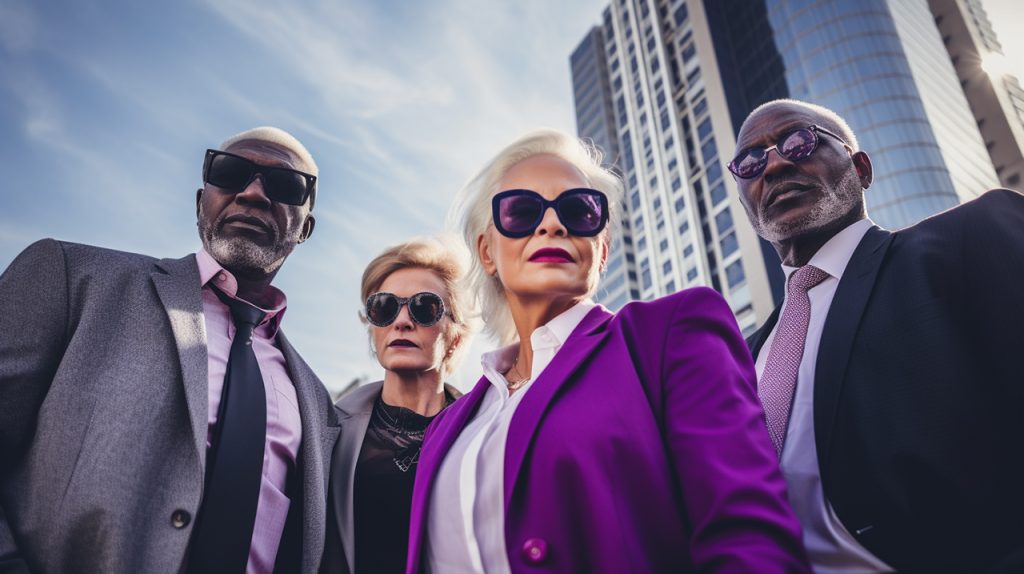
Getting older means having to deal with change. My grandfather says only the lucky ones get that privilege. 👴🏻🧓🏻
One of those changes is related to sleep patterns.
It’s important that seniors are aware of those changes, and also of common myths that need to be dispelled. Having this type of information, and acting upon it appropriately, can result in a measurable improvement in life quality.
🔎 Feel free to jump to your preferred section in this article:
1. Sleep Patterns
2. Common Sleep Disorders
3. Causes
4. Consequences
5. Solutions
6. FAQ
1. Sleep Patterns in Old Age
Here are the most common ways aging affects sleep:
- Changes in the circadian rhythm can result in older adults going to bed earlier and waking up earlier than younger adultsx
- A decrease in melatonin production can result in a decrease in sleep quality and overall sleep metrics.
- More time is spent at the Light Sleep stage, and less time in the Deep Sleep and REM Sleep stages.
- More awakenings during the night.
- Less adaptability to new sleeping schedules.
It’s important to understand that just because these changes are to be expected, that doesn’t mean there’s nothing that can be done about them.
Similarly, it is also important not to believe certain myths about sleep in old age, and make the mistake of simply accepting them as the inevitable reality.
1.1 The Myth of Sleep Requirements
For instance, there is a commonly held belief that older people need less sleep. This is not true.
I suspect the two reasons behind this myth are:
- The aforementioned changes in circadian rhythms that result in older people going to bed earlier and getting up earlier, can give the impression to others that they sleep fewer hours;
- There is a confusion between the notions of a) older people sleeping fewer hours, and b) older people needing to sleep fewer hours.
What I mean by point 2 is this: If you check the CDC table for the recommended amount of sleep by age group, you will realize that older adults should ideally sleep between 7-9 hours per night — making it the same as younger adults.
This means that if you, as an older person, feel you are not getting enough sleep — and feel like you need it — then it’s time to start implementing some lifestyle changes to achieve those 7-9 hours, and refuse to be satisfied until you can get to that state.
2 Common Sleep Disorders in Older Adults
Sleep disorders can affect anyone at any age, but the changes older people go through might make them more prone to certain ones.
- Insomnia: having trouble falling asleep or staying asleep throughout the night.
- Sleep Apnea: stopping breathing or breathing shallowly while asleep, causing people to wake up frequently.
- Restless Legs Syndrome: feeling an urge to move the legs while trying to fall asleep.
- REM Sleep Behavior Disorder: acting out dreams physically while in REM sleep.
3. Causes of Sleep Disorders in Older Adults
Sleep in older adults can be affected by factors of different natures:
3.1 Physiological Changes:
- The circadian rhythm of older people is typically less sensitive to light and dark cues. This happens due to the degeneration of the suprachiasmatic neurons and reduced sensitivity of the eyes to light.
- The calcification of the pineal gland over time is another reason affecting the production of melatonin in seniorsx
- Reduced production of growth hormone, which stimulates deep sleep or slow-wave sleep.
- As the body gets older, some pain might develop, potentially interfering with sleep, and increasing the number of awakenings per night.
3.2 Lifestyle and Environmental Changes
- After retirement, some retirees may experience more freedom in their schedules, which can lead to irregular sleep habits. Retirement can also lead to mental health issues, which we will discuss below.
- Older people might not be as inclined to exercise as younger people, for various reasons. Since exercise is excellent for achieving better sleep quality, remaining inactive can significantly impact overall health and sleep quality.
3.3 Physical Health Complications
Some health conditions can affect how well older people sleep at night, such as:
- Diabetes
- Heart disease
- Arthritis
- Asthma
- Dementia and Alzheimer’s disease affect the brain’s ability to regulate the sleep-wake cycles, potentially making people suffering from it more active at nightx.
- Nocturia (the need to urinate during the night). This is a condition that affects a large percentage of older peoplex. It can be caused by the natural aging process, but also due to health conditions such as diabetes, prostate issues or urinary tract infections. Some medications common among the elderly, such as diuretics or blood pressure drugs, can also cause nocturia as a side effect.
3.4 Mental Health Complications
- Depression and anxiety: after retirement some elders may see their socialization rates take a significant hit, resulting in social isolation, loneliness, boredom, and loss of purpose. Depression and anxiety are strongly correlated with issues like insomnia.
- Grief: one of the worst parts of getting old is watching others leave this plane of existence. Losing loved ones results in a grieving process that can affect sleep for a long time.
3.5 Medications
It is normal for older people to develop more health issues over time and, as a consequence, to take a higher amount of medications. Some of these can also interfere with sleep quality, such as medications for:
- High blood pressure: side effects might include insomnia, nocturia, nightmares, nervousness, tremors, and a heart rate increase.
- Painkillers: some painkillers can contain caffeine or cause stomach pain, which can disrupt sleep.
4. Consequences of Poor Sleep in Older Adults
I have previously written about how sleep deprivation can affect people in acute and chronic ways, ranging from reduced energy and cognitive functioning to cancer and heart disease. All those effects mentioned in that article also apply to the elderly.
However, the effects of sleep deprivation on the elderly should be taken even more seriously, since they can have some specific characteristics such as:
- Increase the risk of falls: sleep deprivation will exacerbate the higher risk of fallsx that older people already naturally suffer from (due to reduced muscle mass and balance issues)
- A more concerning cognitive decline: chronic sleep deprivation can accelerate cognitive decline and increase the risk for Alzheimer’sx, conditions that many older people are already at risk of developing.
- Worsening of chronic conditions: sleep deprivation can lead to elevated blood pressure or poor blood sugar control, worsening conditions like hypertension, diabetes, or heart disease.
- Decreased pain threshold: lower pain tolerance will be problematic to those suffering from chronic pain conditions such as arthritis, fibromyalgia, and neuropathy.
- Compromised Immune Function: this can affect anyone suffering from sleep deprivation, but infections can be more complicated in older individuals.
- Accelerated aging: a University of California found that depriving older people of sleep, even for just one night, is sufficient to accelerate their biological clockx, which means they will age faster.
- Higher risk of death: short and long sleep durations in older adults have been linked to increased risk of deathx.
5. Solutions for Poor Sleep in Older People
It is important that older people don’t accept poor sleep as an inescapable fate of old age. There are plenty of things that are proven to improve sleep, even in senior citizens.
- Help your body regulate your circadian rhythm by maintaining regular exposure to natural light (i.e. going outside during the day)
- Talk to your doctor about the possibility of occasionally supplementing with melatonin, to offset the natural reduction of levels old age brings.
- Stay socially active
- Find meaningful hobbies or activities that bring meaning and value to your life.
- Consider talking to a psychotherapist so that you have a professional helping you keep your mental health in check.
- Exercise at least 3 times a week. Even light-to-moderate can have tremendous benefits to sleep and health in general.
At 30, I exercised to look good. In my 50s, I exercised to stay fit. In my 70s, I exercised to stay ambulatory. In my 80s, I exercised to avoid assisted living. And in my 90s, it’s just going to be out of defiance!
Dick Van Dyke at age of 95
- Pay attention to your nutrition, because it can affect your sleep quality.
- Avoid drinking too much before bed to avoid nocturia.
- Have a good sleep hygiene.
- Have a comfortable bed: reduce discomfort and pain levels by using orthopedic pillows, heated blankets, or mattress toppers for extra comfort.
- Keep in touch with your doctor.
- Need more solutions? While we have already presented you with powerful solutions above, you can still read our complete and extensive list of Sleep Deprivation Solutions for more ideas.
6. FAQ: Answering Some Questions
Q: I’ve noticed a sudden excessive sleepiness in an elderly relative. Is it a bad sign ❓
Sleeping too much can potentially indicate signs of inflammation in the body. These cases can indicate health conditions such as diabetes or heart diseasex.
However, only a proper diagnosis by a medical professional can determine if that is the case; if it is something else; or if it is nothing to worry about.
Conclusion
Those who have had the privilege of reaching their golden years have now entered a chapter in their lives where there’s a unique chance to not only deepen a journey of personal development but also to inspire the younger generations with the elegance of aging well.
To do that, devoting some time to tackle any sleep challenge that may arise, is a worthwhile investment. Because aging, when supported by good sleep and healthy choices, becomes a beacon of inspiration for all.

🌙 If you enjoy sleep-related content, join our community! Subscribe to our newsletter, follow us on your favorite social media, and join us for a real-time chat on Discord ☀
